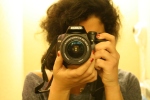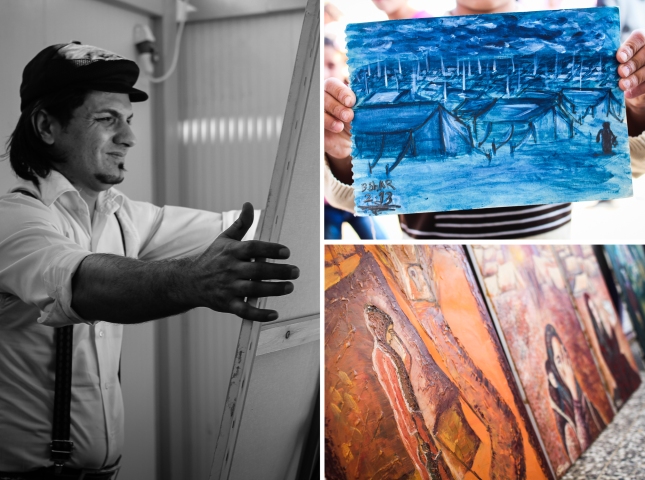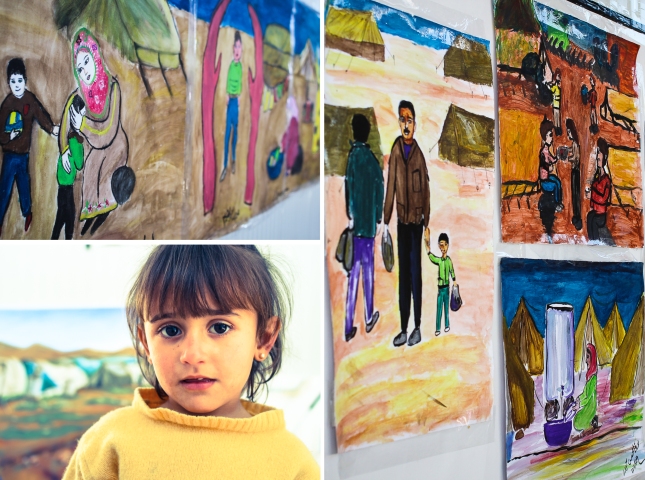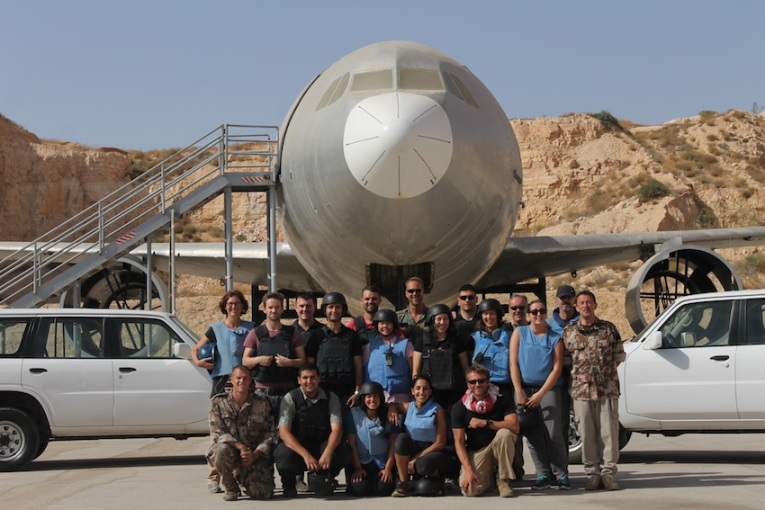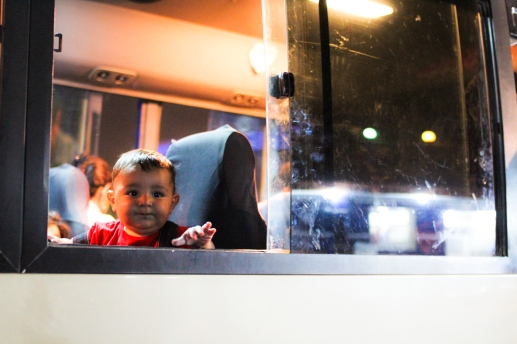I moved my stuff! Feel free to check out www.nadineajaka.com.
Posts from the Blog Posts Category
Choose another category?
Goodbye Jordan
I’m leaving this home for two years and it is truly bittersweet. I could write a post about all that I’ve learned, but probably it wouldn’t fit. Thank you all for following this journey, a large part of it is here — in the photos, in the posts, in the random book excerpts and videos. At some point I will move all of this to a personal website, but for now it sits here as a snapshot of the two years I spent after college stumbling my way through everything.
Next stop: Washington DC. Goodbye, Jordan. You’ve been sweet and difficult and kind and spectacular, and I can’t wait to be back.
On traveling around Baghdad
For the past two months my hair has been falling out. Clumps in the shower. Strands around my desk. My hairdresser commented on it, the rate and amount of my hair loss. The only answer I had for her was, “I’m really, really stressed. I have a big trip coming up.” “Where to?” “Iraq.” “Really? Where in Iraq?” “Baghdad.” She lowers her arm and we stop shouting over the whir of the blowdryer. “Don’t go there,” she says. “Wallah, it’s no place for anyone. They shoot people in the street.” She clicks her tongue and continues partitioning my hair into clips, muttering about my youth and my femaleness and my complete insanity.
I was, honestly, very nervous to go to Baghdad. The night before I left I had a real-life emotional breakdown—crying quietly in my bed because I couldn’t find my wool socks. I wouldn’t be staying in the secured green zone, instead I’d be in a hotel in Karrada district, spending my days in the communities to take photos and gather statements. I arrive after dark on the 24th, met with wind and rain and an airport employee named Samir. “Welcome!” he smiles, grabbing my bag and leading me through the myriad of checkpoints. “U.N. Lebanese. Working. Five days.” He fields all the questions while I stare out the window and zip up my fleece jacket past my chin. It is much colder than I had anticipated.
The city seems like it is crumbling, barely hanging on to remnants of what once was a cultural and economic hub. There are blast walls everywhere and garbage litters the streets, floating in roads that have become streams during the relentless rainy season. Checkpoints make it so that the traffic is unbearable. There are no stoplights that work. When we go out to more conservative parts of the city, I am told to cover my hair.
“And when you greet people, just say asalam w alaykum, so they don’t hear your accent,” Amir advises. Baghdad feels inhospitable, yet I am incredibly protected because of my status as a visitor and a young woman. After the seventh time my colleagues ask me if I feel safe, I fight the urge to tell them I’m not so fragile – but I just acquiesce to their suggestions to hide my camera, to put on my scarf, to lay low. I am breakable, I am human.
It is also incredibly beautiful. Palm trees line the Tigris River, and the city is steeped in green. A damp haze encircles each streetlight, and the crowded, colorful streets just seem so bustling, so Arab. One night, we stop to get kunafeh in the busy shopping area in Karrada, a security guard out of sight, but tailing us nonetheless (“He was in Blackwater,” a colleague tells me, as if this will assure our safety). We swap stories while cutting the syrupy, cheesy pastries with plastic forks – the crispy outer layer is bright orange, as if to fit in with our bold and disorderly surroundings. I tell my colleagues about Amman and I show them pictures of my twin sister because it’s always a great conversation topic. “My father was a communist,” Assim says, puffing on his cigarette, “we always listened to Lebanese singers.” I laugh because I’m nervous and also confused at the connection, but I don’t question it.
My days are spent hopping from one community to the next, shuttled between rural and urban areas, taking photos when I can and writing things down when I can’t. In Latifiyah, one of the most dangerous areas in the early 2000s, I see a long factory building with chunks taken out of it, a fan still spinning in one of its windows. The stories I’m gathering are ones of resistance: hundreds of Iraqis, forced to flee from unstable areas of Baghdad years ago, are now back, creating their lives anew in the midst of a paralyzed country. This is why I am here, to show the hope and momentum and easy grace with which so many residents continue to move forward. From baking lessons, to makeup tutorials, to greenhouses and beekeeping farms – here, it is the ordinary that is exceptional, that is unbearably moving. I see a 50-year-old woman learn how to decorate a cake, and think how brave and also sad it is that she is piecing together her livelihood now. I am fed lots of warm bread by lots of warm people. Soon enough, Thursday comes, Thanksgiving, and I am set to travel to the airport, mentally checking that I have everything that I need.
“Listen, you better get there okay,” Amir tells me as I jump up into the SUV. “Or Obama will make a problem for us – they’ll invade us again, this time because of you!” Laughs from all the men, I roll my eyes. I thank them for their hospitality, which has been unparalleled. Five checkpoints later and I am safely in BIAP, watching some kids chase a flock of pidgeons that have somehow made it inside. I buy nail polish from the sparsely-stocked duty free shop and give myself an at-the-airport manicure. I exhale and wait for the boarding call.
On art in refugee camps
We arrive at the Domiz cultural center in the early morning to set up for the event: an art festival showcasing children and adult refugees’ paintings and drawings. I shuffle my feet along the greyish floor, noting that the hallways and walls are completely barren. Fadi explains to me what is going to happen: we will adorn the walls with kids’ paintings, and set up the adults’ work on easels all along the halls.
“The adults are all professional artists who live in the camp,” Fadi tells me, taping a colorful drawing to the wall. I blink. I never considered that there would be professional painters living in Domiz. The idea seems, embarrassingly, incongruous to me. I see the camp as a place where people go just to survive. Maybe they sew to make a living, set up a small construction shop, give people haircuts—they don’t make beautiful art. But as the paintings go up one by one, it is so clear that these artists are trained, I mean trained. I notice that every piece is exquisitely, and mournfully, informed by their experiences as refugees.
The afternoon passes by swiftly; it feels like magic and also like heartache. I stop by a painting of large purple fish, swirling and transcendent. Fensa, the artist, explains, “They represent children, taken away from their home. They are like fish out of water, it’s almost impossible to survive.” I ask her why she paints. She says, “to escape from the camp.” It is difficult to be an artist in a refugee camp. Just consider. Materials are hard to come by, as are places to show and sell your work. Samir studied art in university in Syria—in a stylish beret and suspenders, he pouts appropriately for the camera. “I usually like more abstract art,” he says. “But I drew this piece so that the message was really clear,” he gestures towards his colossal painting: a woman wearing a hijab, a child slung on her back, one hand covering most of her face.
Residents peruse the hallways and stop at each painting, while kids run around everywhere, pointing excitedly at their drawings on the walls. Each artist stands next to their easel, explaining the meaning of their paintings to onlookers. I suddenly feel a pressing tug on my chest; how can I capture the loveliness of this event when every inch begs to be photographed, when I have just two hours, when I am just one person? I’m scribbling down statements from people that speak to today’s healing power:
“I drew people afraid when they came from Syria, but then they are happy because they’re safe here.” Rojla, 12. “Painting, for me, helps me run away from the tents. To run away from my situation.” Sipa, 29. “Today, I don’t feel like a refugee.” Fensa, 27.
I kneel down to say hello to a little girl with bouncy bangs and a bowl cut—she gives me a huge smile showing small, chipped teeth, grabs my face in her hands and kisses my cheek. It’s like magic and like heartache.
23
Sorry for using this blog as a photo dump and putting zero of my thoughts on here. Literally zero. I’ve been feeling unmotivated to write, mostly because I’ve passed the one-year mark in Amman, and this stopped feeling like a new and different experience a while ago. It seemed self-indulgent to blog. Would I publicly muse about my daily life if I were in a U.S. city? Probably not. I have a full time job, now, and things remain in their normal state of semi-normalcy. Nevertheless, I will mark this milestone with the proper amount of reflection.
Last week, I turned 23. That makes two birthdays spent in the country of Jordan. I think people must be wondering what I’m still doing here (this crosses my mind sometimes, too). I was supposed to be gone for a year, to have this ten-month stint and then return to the United States. Instead, I found myself searching for excuses to prolong my stay—first for the summer, then for the fall, and now probably until next summer. There are many reasons for this, of varying lengths and complexities, but I guess the short answer is that I love being in the Middle East. I like Amman, how tame it is but also how things are happening underneath the surface and how easy it is to find those things out. I like how full of foreigners it is, Arab and non-Arab and everything in between. I like my job and hearing people’s stories. I like being in the middle of things, feeling connected to the disquiet, disruption and dreaming that are happening in the region around me. So, now I’m 23, but I don’t feel uncertain or insecure about my choices—for the most part.
Recently, though, I’ve picked up a series of weird motivational habits. Sometimes I sit in the café with sound-cancelling headphones and the volume turned up, listening to crooked smile and pretending that J. Cole is singing to me. In the morning, I drink my coffee sitting cross-legged on the kitchen floor because it makes me feel serene or at the very least earthy and unconventional. I often look at my reflection and say evenhanded things like you are capable or you can do it or please don’t unravel today. I wear mascara a lot more often. I’m not entirely unfazed by being young but also having responsibility for my actions and being largely untethered to anything or anyone. It requires a particular type of emotional self-care, which I have embraced maybe a little too fervently.
In summary: 23 feels great, better than 22, and I like where I am and where I’m headed. Aaaanyways. Later, my friends. I’ll write again soon about something else of minimal importance. Salaam.
A drumroll in Iraq, and other analogies
I spent last week at UN security training to prepare for some potential trips to the south of Iraq. My job is cool in the sense that it allows me to travel from Amman to Iraq and take pictures and talk to people, which really are my two favorite things. Nevertheless, the security situation in Iraq now is precarious to say the least, and there has been an upsurge is widespread, coordinated attacks since April of this year. In fact, just two days ago a bombing in Baghdad killed over 60 people. The violence is sectarian, and has a lot to do with the country’s history of Shia-Sunni tensions and now spillover from what is happening to the west in Syria. In fact, over 4,000 people have been killed in Iraq since April, with 804 deaths last month alone. Call it what you will, but the situation is undeniably escalating.
As Richard, the ex-UK military sergeant running the training, told us: “you’ve picked an interesting time to work in Iraq, folks.”
All 15 of us arrived early last Monday for training, ready and nervous for the week ahead. The first thing that happened was the UNAMI security officer collected a strand of hair from each of us – “in case we have to identify you at some point in the future,” he said reassuringly. We spent two days in the classroom learning about hostage situations and IEDs, as well as getting certified in emergency first aid. Then, we strapped on our bullet proof vests and helmets and spent the rest of the week “in the field.” I’m not going to talk too much about this, but basically we were put in a series of makeshift (but realistic) dire security situations and told to just sort of…handle it. From being shot at, to held hostage, to having grenades tossed our way, to encountering people bleeding profusely, to overtly aggressive checkpoints, we were certainly tested. Some people unraveled under pressure, some kept it cool; I might have cried a little bit when someone put a sack over my head. It’s fine. The main point is that I made it through, and now I feel equally prepared and frightened for any upcoming trips to Iraq. Who can triage casualties? Who knows the proper position to take when a grenade goes off? And the NATO phonetic alphabet? These people.
Gallivanting
I’m off again–this time to the U.K. to be reunited with one of my closest friends and a member of my Kenya cohort, Dylan. I spent a summer in western Kenya two years ago and have remained close with a few friends, Dylan being one of them. We first bonded on a doctor’s visit because we both had contracted malaria at the same time, and it’s only been uphill from there. Now, I get to see this tall, intelligent, Canadian man in person for the first time in two years! I predict that with our penchant for photography and under-planning that I’ll return with great photos and even better stories.
Until then, I’ll keep posting Lebanon photos on this thing–have you planned a Beirut trip yet? Yalla, get on that.
On border openings
It has been a frenzied week at work, as the number of Syrians flooding into Northern Iraq has climbed to nearly 40,000 since the border opened last Thursday. I found out the news at the beginning of the day on Sunday, and that night at 1 am I was on a flight to Erbil. I arrived just after 3 am, and about three hours later a UN driver picked me up to head to the border. I arrived at the Sahela border crossing as the day was beginning to heat up, to take photos and interview a handful of the thousands of Syrian Kurds waiting to cross into Iraq. It looked like something post-apocolyptic, but with people: the ground made up of flattened trash and belongings, sand from the expansive surrounding desert-like terrain being blown everywhere.
I didn’t want to write a depressing post. How much do you have to hear before throwing your hands up in disgust and despair and simply reconciling yourself to the fact that the world is broken? What’s your saturation point? For me, it doesn’t take much. I hate the terms that are being used to describe this largely unprecedented event–a “wave” of refugees, a faceless tide of fear and sorrow and a stark reminder of the mess that is Syria. As if nearly constant news of wanton killing wasn’t enough. I don’t know if that’s what I want to talk about. I want to talk about Khunaf, who married her husband three days before crossing the border and laughed when she told me all they’ve done is hold hands. I want to talk about watching our staff in action until deep into the night, red-eyed from lack of sleep but determined to transport every single person to safety. I want to talk about literally the cutest baby I have ever seen waving at me from a bus window, and my heart wanting to explode. I want to talk about life going on.
I’ll leave you with a photo of the aforementioned chubby baby–he’s on his way from the border to safety, where the night won’t be filled with the sounds of bullets and the walls of his family’s tent will be more secure than the concrete panels of his house in Syria. “The world spins. We stumble on. It is enough.”
Bhebak ya Lubnan
It’s been a year, but I’m finally headed back to Beirut! Under my U.S. State Department funded Fulbright grant, travel to Lebanon has been banned for the duration of my fellowship. But, now I am free from the shackles that bind and free to taste the salty Mediterranean air in the land that my grandparents still call home.
I’m armed with a new camera lens and a tremendous amount of excitement to see my friends and family – forgive me for the week long hiatus while I inevitably eat too much and sleep too little. Pictures and stories to follow, insha’allah.
I can’t eat in public.
It’s Ramadan in Jordan. Ramadan, the ninth month of the Islamic calendar, the month of fasting. From sunrise to sunset, Muslims abstain from eating and drinking – then everyone gets to have iftar at around 7:45 p.m. where they eat and are merry until about 4 a.m. the next morning. Then, it begins again. Here are ten things I’ve noticed that happen when you are observing (or maybe not observing) Ramadan in a Muslim country.
1. The work day gets shortened. No lunch break. Leave at 2:30 pm. Sleep.
2. Every single restaurant is closed during the day.
3. Insane traffic at 3 p.m., but absolutely no one on the streets at 7 p.m.
4. See title.
5. Weird hours. It’s impossible to know when any grocery store or flower shop or internet cafe will be open. Your best bet is to go at midnight.
6. This is literally the only time Amman has a nightlife, and by that I mean there are actually people out and about after midnight. Wild and crazy means getting falafel at 3 a.m. with everyone else in town.
7. Don’t eat in public. Or drink. I said that already.
8. Grumpier-than-usual taxi drivers.
9. Dinner is automatically called iftar, even if you aren’t fasting.
10. Most importantly, an excuse every night to have all your friends over to eat and stay super late laughing and stuffing your faces. It’s what everyone is doing.
